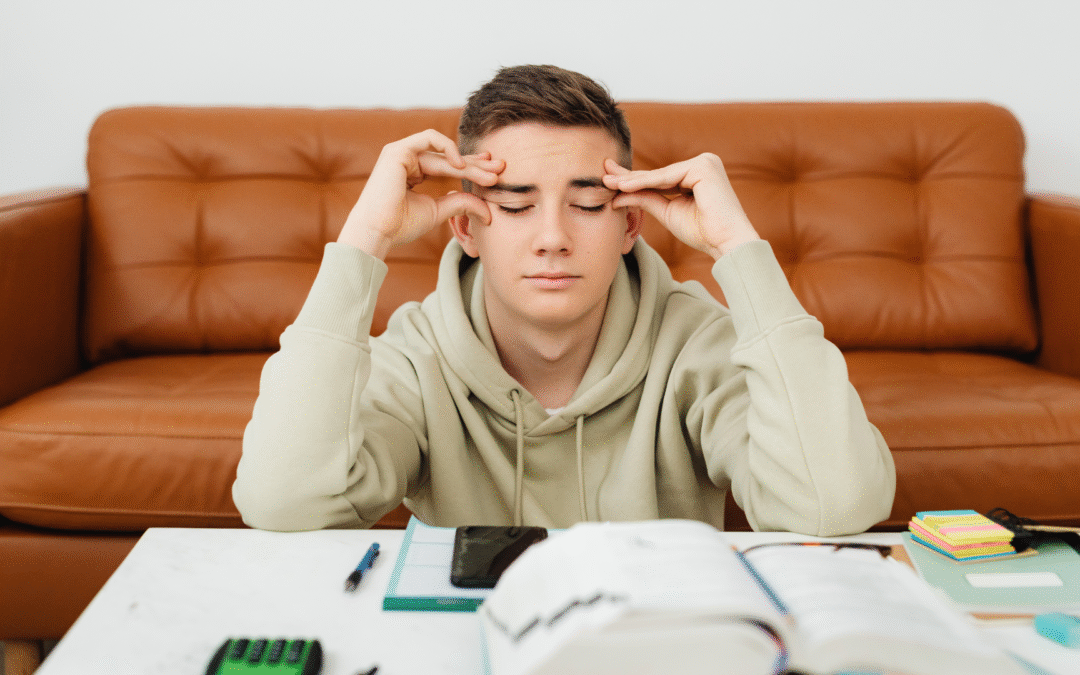As fall unfolds with new schedules, rising academic demands, and social pressures, many teens face more than normal stress, and anxiety can intensify and disrupt daily life. At The Children’s Center, we help families navigate these challenges with evidence-based care. As a Regional Clinic of the National Social Anxiety Center (NSAC), our work is supported by nationwide expertise in teen anxiety treatment. In this blog post, explore key signs, proven strategies, and treatment options to help your teen thrive.
Understanding Teen Anxiety: Beyond Everyday Stress
Anxiety is not just “typical teenage nerves.” It can present as constant worry, physical symptoms (like stomachaches or headaches), or avoidance of situations that feel intimidating. For teens, these symptoms may blend into everyday stressors, making it harder for caregivers to recognize when professional support is needed.
Research shows that anxiety disorders are among the most common mental health conditions affecting adolescents. Left untreated, they can hinder academic performance, stunt social growth, and even lead to depression or substance use. The good news? Anxiety is highly treatable. With proper care, most teens learn strategies to manage their symptoms and thrive.
Recognizing the distinction between normal stress and clinical anxiety is the first step. Occasional nervousness before an exam is expected. But if your teen avoids school altogether, panics at social events, or expresses persistent dread without clear cause, these are red flags. Open communication, observation, and willingness to seek help can prevent anxiety from taking a stronger hold.
Signs Your Teen May Need Support
While every teen is different, some warning signs suggest that anxiety may be more than a passing phase. Look for patterns that last several weeks or months, or behaviors that significantly interfere with daily life.
Common indicators include:
- Frequent physical complaints without clear medical cause (headaches, stomachaches, fatigue).
- Sudden changes in sleep habits—difficulty falling asleep, staying asleep, or oversleeping.
- Intense worry about performance in school, sports, or friendships, even when no problems exist.
- Avoidance of social gatherings, group projects, or activities once enjoyed.
- Irritability, restlessness, or feeling “on edge” most of the time.
- Perfectionism that paralyzes progress or leads to meltdowns.
- Drop in grades or reluctance to attend school.
- Withdrawal from family and a preference for isolation.
Not every sign means an anxiety disorder is present, but taken together, they signal the need for a closer look. Trust your instincts as a caregiver. If something feels off, it’s worth exploring further.
Supporting Your Teen at Home
Professional therapy is essential, but the role of parents and caregivers cannot be overstated. Home should be a safe space where your teen feels understood, supported, and encouraged to share openly.
- Start with empathy. Avoid minimizing their fears or saying “just relax,” which may heighten feelings of isolation. Instead, validate their emotions: “I can see this feels really hard for you.” Regular, judgment-free conversations help reduce stigma and build trust.
- Encourage healthy routines. Consistent sleep, balanced nutrition, and regular physical activity are powerful tools for managing stress. Model self-care by prioritizing your own well-being, showing that coping skills are a lifelong practice.
- Set realistic expectations. Celebrate effort, not perfection. Teens struggling with anxiety may need extra reassurance that mistakes are part of growth. Limit pressure by focusing on progress rather than performance.
- Finally, stay connected to your teen’s school and extracurricular environments. Teachers, coaches, and counselors can be valuable allies in spotting early signs of anxiety and reinforcing treatment strategies outside the home.
How The Children’s Center and NSAC Work Together
When families come to The Children’s Center, they receive personalized care rooted in compassion and evidence-based practice. What makes our clinic unique is our connection to the National Social Anxiety Center (NSAC).
NSAC supports our work by:
- Research: Advancing the science of social anxiety treatment.
- Collaboration: Sharing expertise among regional clinics nationwide.
- Dissemination: Providing training and knowledge to other mental health professionals.
- Public Education: Raising awareness and reducing stigma about social anxiety.
Through this affiliation as a Regional Clinic, families who walk through our doors benefit from a treatment approach informed by national expertise and enriched by a collaborative community of clinicians. The Children’s Center applies these insights locally, helping teens move from anxiety to resilience, one step at a time.
Why Professional Treatment Matters
Parents sometimes hope that time alone will ease a teen’s struggles, but untreated anxiety often intensifies. Professional treatment provides both coping skills and the reassurance that your family is not navigating this challenge alone. At The Children’s Center, clinicians draw upon evidence-based therapies, which have been proven effective in addressing teen anxiety.
Cognitive Behavioral Therapy (CBT) is a cornerstone approach, teaching teens to identify anxious thoughts, challenge unhelpful patterns, and practice healthier responses. Exposure therapy, a structured method of gradually facing feared situations, is especially effective for social anxiety. By safely testing their fears in a supportive environment, teens often realize that what once felt impossible becomes manageable.
Here, The Children’s Center’s clinical team focuses on meeting teens where they are: listening, adapting, and developing practical skills that apply to everyday life. With the support of NSAC’s national research and collaborations, we ensure that our care aligns with the best practices available across the country. Contact us today.

